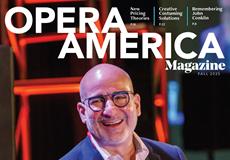OPERA America Awards over $100,000 in Discovery Grants to Support Eight New Works by Women Composers
Generously supported by the Virginia B. Toulmin Foundation
OPERA America is pleased to announce the latest recipients of the Discovery Grants from the Opera Grants for Women Composers program. These eight composers will receive a total of $104,000 to support the development of new opera and music-theater works. The Opera Grants for Women Composers program promotes the generation of new works by women and raises their visibility across the entire field. The grants are made possible through the generosity of the Virginia B. Toulmin Foundation.
The 2022 recipients are:
- Layale Chaker, for Ruinous Gods
- Ashi Day, for Waking the Witch
- Susan Kander, for Carry My Own Suitcase
- Anne Leilehua Lanzilotti, for Lili’u
- Pamela Madsen, for Why Women Went West: Eleven Eleisons from East to West
- Rachel J. Peters, for Nothing Except My Genius (working title)
- Amber Vistein, for Dark Exhalation
- Alyssa Weinberg, for DRIFT
See below for profiles of the composers and their works.
In addition to cash awards, OPERA America invites and provides travel support for all grant recipients to attend its annual Opera Conference and New Works Forum, enabling them to develop relationships with potential creative partners and producers. Grant recipients also receive mentorship on the artistic and business aspects of new work development.
Grantees were selected from an applicant pool of 48 composers by a panel of industry leaders consisting of Debra E. Evans, arts administrator, advocate, and consultant; Carla M. Lucero, composer; Kelley Rourke, librettist, translator, and dramaturg; Maria Sensi Sellner, conductor and artistic and general director, Resonance Works Pittsburgh; and Carlos J. Soto, director and designer.
“When the Opera Grants for Women Composers launched in 2013, less than 20 percent of world premieres in America were composed by women. Nine years later, that percentage has more than doubled, with 44 percent of new American works in 2020 composed by women,” stated Marc A. Scorca, president/CEO of OPERA America (referencing an audit conducted by OA). “This data speaks to a field-wide desire to produce more works by women composers and underlines the value of the Opera Grants for Women Composers program. We are proud to continue this work with the generous support of the Virginia B. Toulmin Foundation.”
OPERA America is committed to increasing gender parity across the field through multiple initiatives. These include the Opera Grants for Women Composers program’s Discovery Grants and Commissioning Grants, Opera Grants for Women Stage Directors and Conductors (generously supported by the Marineau Family Foundation), Mentorship Program for Women Administrators, and Women’s Opera Network.
OPERA America’s strategic philanthropy supports field-wide innovation with an emphasis on new work development, co-production, audience building, and increased civic practice. Since the inception of its granting programs, OPERA America has awarded $20 million to the opera field to support the work of opera creators, administrators, and companies.
More information about OPERA America’s grant programs is available at operaamerica.org/Grants.














